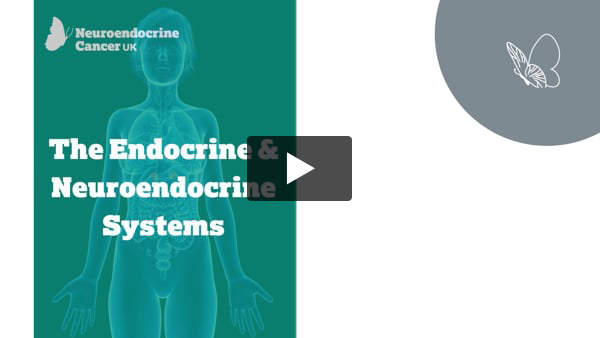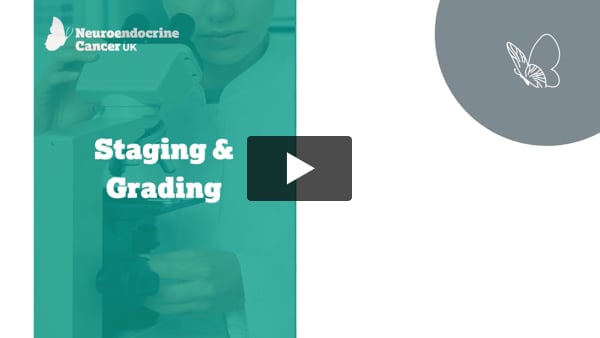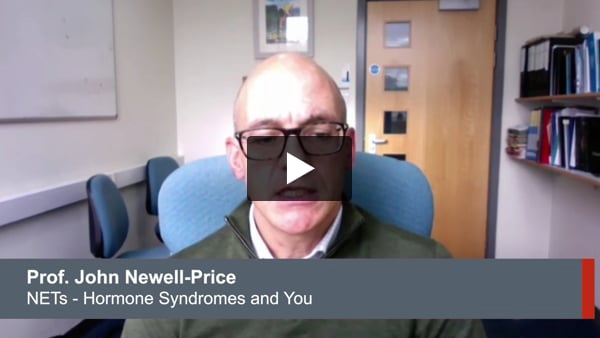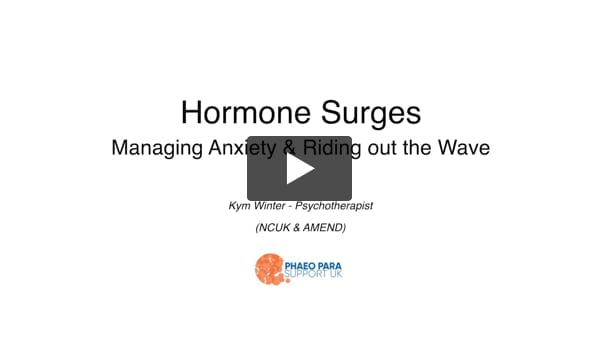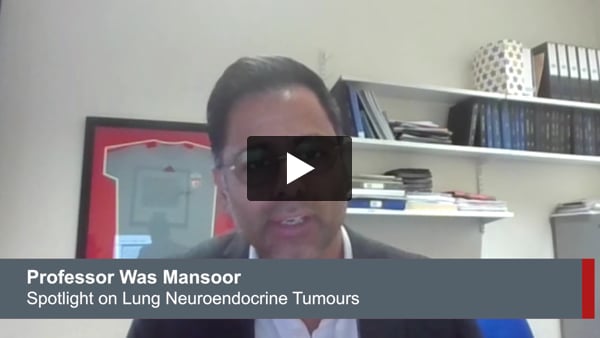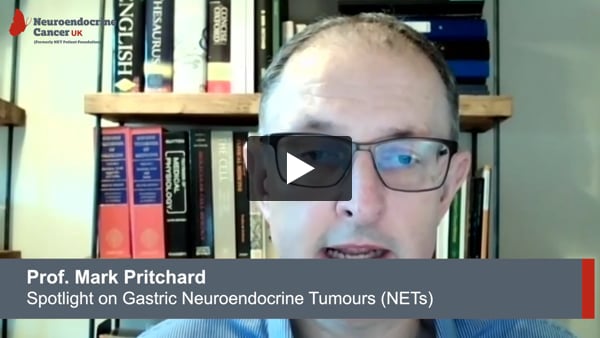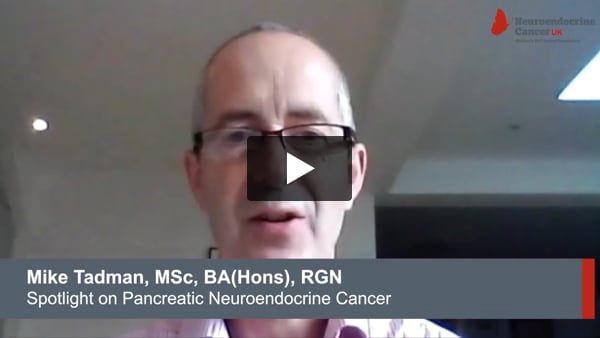Understanding Neuroendocrine Cancer
No images? Click here

NCUK's Not Just NE Cancer Virtual Series
Hello and welcome to our most recent roundup of the 'Not just NE Cancer' virtual series. Throughout April we looked at ' Understanding Neuroendocrine Cancer'.
We particularly focused on the following:
What is Neuroendocrine Cancer? | Primary & Secondary Neuroendocrine Cancers | Differences in Neuroendocrine Cancer | Syndromes | High Grade Neuroendocrine Cancer
The Endocrine & Neuroendocrine Systems
The endocrine and neuroendocrine systems communication between the cells and tissues of the body is essential to maintain normal body functions. The complex systems responsible for this are the endocrine and neuroendocrine systems. Select play to watch this short video to learn more.

Primary & Secondary Neuroendocrine Cancer

Differences in Neuroendocrine Cancer
Staging & Grading
Select play to watch this short video where Professor Caplin talks to us about staging and grading.
Functioning
Function refers to the hormone and chemical production and release by these cells.
- Non-functioning neuroendocrine cancer cells usually retain their ability to release normal amounts of hormone or chemicals
- Functioning neuroendocrine cancer cells produce and release abnormal amounts of the hormone or chemical they are usually responsible for.
This abnormal release can result in symptoms and / or syndromes. For more information about Syndromes click here.
N.B. Functioning may also be used as a term to describe whether your cancer is ‘positive’ on scans, that is, can it be seen on ‘functional imaging’ such as Octreotide, Gallium and / or FDG-PET scans.
Differentiation

Syndromes
Neuroendocrine Cancer-related Syndromes occur due when Neuroendocrine Cancer causes changes to the cell resulting in the abnormal production and excess release of specific peptides and / or hormones by Neuroendocrine Cancer cells -for example Carcinoid Syndrome (Serotonin, Histamine & Kinins).
These syndromes occur in approximately 40% of all Neuroendocrine Tumours, rarely occurring in Neuroendocrine Carcinomas.
Select play to watch Professor John Newell-Price, Professor of Endocrinology at the University of Sheffield talk to us about NETs - Hormone Syndromes and You.
Clinical Hypoglycaemia is associated with Neuroendocrine Tumours (NETs) that form in your pancreas or the upper part of your small intestine (duodenum). These tumors, called Insulinomas, secrete large amounts of the hormone insulin, which causes your blood sugar levels to drop – sometimes quite severely. We need a certain blood sugar level to ensure our body (and all of it cells) has enough energy to function normally. When blood sugar levels drop too low, or too severely, this can lead to symptoms that may include dizziness, light-headedness, sweating, hunger, confusion
& irritability. If the level drops too low or too severely this can even lead to coma / loss of consciousness. Symptoms often get better, are alleviated, by eating – so weight gain – sometimes to obese levels, rather than weight loss, can occur.
Clinical hypoglycaemia is proven through fasting blood tests, that are carried out in hospital, in order to be completed safely.
Werner-Morrison Syndrome is associated with Neuroendocrine Tumours (NETs) that form in your pancreas. These tumours, called VIPomas, secrete large amounts of Vasoactive Intestinal Peptide (VIP). This peptide helps regulate gastrin, it works to neutralise stomach acid when food leaves the stomach and enters the small bowel – which helps with nutrient uptake, and promotes the secretion of water and electrolytes by the small and large intestines. It also works to ensure that food passes through the small and large intestines slowly enough for nutrients from food to be absorbed properly (a
process known as transit time).
Too much VIP can result in reduced levels of acid in the stomach. very watery, frequent and high-volume diarrhoea (up to or in excess of 3 litres a day), and severe changes in potassium levels in the blood (low potassium) – that may affect heart rate. Hospital admission may be required to deal with these symptoms – as severe symptoms can be life-threatening.
Glucagonoma Syndrome is associated with Neuroendocrine Tumours (NETs) that form in your pancreas or the upper part of your small intestine (duodenum). These tumors, called Glucagonomas, secrete large amounts of the hormone glucagon, which can cause your blood sugar levels to rise above normal. Glucagon works along with the hormone insulin to control blood sugar levels and keep them within set levels. When glucagon levels rise too high, this can lead to Necrotising Migratory Erythema (NME) – a skin rash that can spread across the body that may look like eczema.
Glucagonomas may also cause symptoms of diabetes, (like feeling tired, going pee a lot, dry mouth), nausea, weight loss and a low haemoglobin (anaemia). Diarrhoea, blood clots and other changes to skin, nails and hair may also occur.




|




|
Understanding Neuroendocrine Cancer - Hormones & Managing Surges.
What are hormones?
Hormones are necessary for many of the body’s normal activities to occur. They are vital to our growth and development, our appetite and digestion, activity and sleep – and also play a role in our immune response and mental health.
If our hormone levels are abnormally increased or decreased this can result in a number of symptoms or syndromes occurring that can affect both our physical and psychological well-being.
Hormones and Neuroendocrine Cancers
When neuroendocrine cells become cancerous – there is a risk of excessive or ectopic secretion of hormones. N.B. Less than half of all Neuroendocrine Cancers are associated with abnormal hormone release.
Excessive secretion – also known as hyper secretion – occurs when the normal hormone release escapes normal control.
Ectopic secretion refers to the secretion of hormones by cells that do not normally produce and/or secrete the particular hormone, for example:
- ACTH release by lung neuroendocrine cancer cells- PTHrP release by pancreatic neuroendocrine cancer cells.
Watch this short video by Psychotherapist, Kym Winter, where Kym provides some useful tips in managing hormone surges.
Pheochromocytoma and Paraganglioma (PPGL)
is associated with Neuroendocrine Tumours of the adrenal glands (Pheochromocytoma) and / or paraganglia (Paraganglioma).
The central part of an adrenal gland, the medulla, is responsible for producing catecholamines which are hormones that include epinephrine and norepinephrine (adrenaline and noradrenaline) – our fight or flight hormones.
Paraganglia are cells or nerve-like structures that form part of the Neuroendocrine System, found close to blood vessels and nerves. Paraganglia sense certain balances in the body including carbon dioxide and oxygen concentrations in the blood and play a role in maintaining normal breathing and heart functions.
Pheochromocytoma and Paragangliomas can produce excess amounts of catecholamines, which in normal health are released when we are under physical or emotional stress. When catecholamine levels are too high this can result headaches, dizziness, facial paleness (pallor), excessive sweating, racing heart rate (palpitations), panic attacks/ sense of doom, anxiety, weight loss, heat intolerance, high (and rarely low) blood pressure (sustained or episodic), nausea (with or without vomiting), breathlessness, depression and / or lethargy.
In rare circumstances PPGL may have a familial link.
High Grade
What is High Grade Neuroendocrine Cancer?
Grade is an essential assessment and measurement of how neuroendocrine cancer cells are developing, growing, dividing and reproducing.
The grade may be determined by counting the cells that are dividing (called mitotic count or MiB1) but more often a test called Ki-67 is used – often expressed as a percentage (%).
Ki67 is a protein present in cells and is involved in cell growth and division. By using this protein to stain cancer cells, an assessment can be made as to how slowly or quickly the cancer cells are likely to grow and spread. So a result of less than 3% indicates that very few cells are actively growing and reproducing, therefore the overall rate of growth would be relatively slow. The higher the percentage the quicker growth can occur.
Typically Neuroendocrine Tumours (NETs) have a lower Ki67 than Neuroendocrine Carcinomas (NECs).
High Grade Categories
Grading is divided into 4 specific categories – depending on growth rate (and cancer cell appearance – also known as differentiation).
However – Neuroendocrine Carcinoma (NEC) will require a different treatment plan than used in most Neuroendocrine Tumours (NETs) – because of the rate of cell growth and the cell differentiation (well vs poorly).
Whilst some High Grade Neuroendocrine Tumours (that is 3a) may benefit from some of the specific tests and treatments used in NEC, Neuroendocrine Carcinomas may benefit more from some of the tests and treatments used in more commonly known cancers – for example chemotherapy.

Neuroendocrine Cancer Complications
Mesenteric Fibrosis.
Mesenteric Fibrosis – is where fibrotic strands form between tissues and organs of the small bowel and mesentery, like internal scar tissue, they connect tissues not normally connected – causing ‘gathering’ or kinking. This fibrotic process, thought to be related to excess serotonin production, can entrap loops of the small intestine and cause partial or complete intestinal obstruction and can lead to bowel ischaemia.
Symptoms can range from mild to severe:
They may be acute (sudden and severe) – for example : signs of bowel obstruction – increasingly severe abdominal pain/cramping associated with vomiting.
Or chronic (occur over time and change in severity and frequency) – for example may be similar to symptoms of Irritable Bowel Disease – abdominal discomfort/cramping, diarrhoea, bloating, altered bowel habit, early satiety (feeling full, even after only a few mouthfuls) and / or nausea.
Intestinal (bowel) ischaemia is a serious condition that can cause pain and make it difficult for your intestines to work properly. In severe cases, loss of blood flow to the intestines can damage tissue and possibly lead to gangrene and/or sepsis (life-threatening infection).
Although this process can develop over time (chronic), small kinks or inflammation/ cramping, can cause a sudden (acute) obstruction which needs urgent medical review – symptoms of acute obstruction and/or ischaemia include:
- Sudden abdominal (tummy) pain that may be moderate or severe
- Nausea and vomiting
- An urgent need to have a bowel movement
- Frequent, forceful bowel movements or no bowel movements at all
- Abdominal tenderness or distention.
Severe, acute symptoms require urgent medical review

Cancer complications and paraneoplastic syndromes (acute oncology) – are very rare and may occur in any form of cancer – and may require urgent medical review.
Most UK hospitals have an Acute Oncology Service (AOS).
Paraneoplastic syndromes occur when a cancer causes unusual symptoms due to substances that circulate in the bloodstream. These substances may be hormones produced by the tumor or antibodies produced by the immune system. They can affect the function of various tissues and organs and cause symptoms at sites distant from the tumor. A rare group within these syndromes specifically target the body’s nervous system (for example Lambert-Eaton myasthenic syndrome – LEMS).]
About 1 in 5 people with cancer (of any form) may develop a paraneoplastic syndrome.

|

|

|

|

|

|

Carcinoid Crisis
Carcinoid Crisis is rare, but if it happens, those most at risk are people who already have Carcinoid Syndrome, however, it may also occur in patients without prior history of carcinoid syndrome. It can occur spontaneously (without obvious cause) but is most associated as being triggered by anaesthesia or tumour manipulation (biopsy, surgery or interventional radiology – e.g. embolisation or ablation treatments).
Therefore, careful assessment and precautionary measures including treatment with Octreotide through an infusion, are usually undertaken before surgery or intervention.
Symptoms are similar to Carcinoid Syndrome but are much more severe – include severe flushing – often accompanied by palpitations / fast, irregular heart rate, low blood pressure, confusion and breathing difficulty – and can be life-threatening.

NCUK provide wallet alert cards for those at risk of Bowel Obstruction and / or Carcinoid Crisis.
Carcinoid Heart Disease (CHD, Hedinger syndrome)
is a rare condition that affects about one in five (20%) patients who have a Neuroendocrine Cancer AND Carcinoid Syndrome (CS), particularly those whose primary is in the small bowel followed by lung, large bowel, pancreas or ovary.
The precise cause is unknown but is thought to be related to raised levels of peptides and hormones produced by Neuroendocrine Cancer cells – in particular serotonin.
In normal health, each time your heart beats, it first fills with blood and then pumps that blood out. The heart has valves that open and close with every heartbeat, helping the blood to flow smoothly and freely in one direction through the chambers of the heart and to the rest of your body. But if a valve doesn’t open or close properly, problems can occur. The body may not get a sufficient supply of blood (stenosis) or, in some cases, blood can seep back into the heart (regurgitation).
In Carcinoid Syndrome raised serotonin levels may lead to the development of plaques on the surfaces of the valves of the heart. Valve leaflets become thickened, retracted and immobile, resulting in either stenosis (failure of valve to completely open) or, most often, in regurgitation (failure of valve to completely close) that causes right ventricular dilatation and ultimately, right heart failure.
VIDEOS
Spotlight on Lung Neuroendocrine Tumours, presented by Professor Mansoor, Lung Neuroendocrine Lead at the Christie Hospital, Manchester.
Spotlight on Gastric Neuroendocrine Tumours, presented by Professor Mark Pritchard, Professor of Gastroenterology at the University of Liverpool.
Spotlight on Pancreatic Neuroendocrine Cancer, presented by Mike Tadman, Senior Clinical Nurse Specialist in Neuroendocrine Tumours at Churchill Hospital, Oxford.
PODCASTS
Real life experiences, practical advice and everything in between. Whether you are diagnosed with Neuroendocrine Cancer or another rare or less common cancer, our podcast series cover topics from initial diagnosis, treatments and follow up, looking after your mental health and the professional perspectives from those involved in your care. Hosted by Catherine Bouvier and produced by Neuroendocrine Cancer UK. We hope this series answers some of your questions or provides a source of support – or both, after all, this is not just NE cancer.
Multiple Endocrine Neoplasia Disorders: In this episode of Not Just NE Cancer, Cathy speaks Jo Grey, CEO of AMEND (The Association for Multiple Endocrine Neoplasia Disorders) about her personal story, the work of AMEND and genetic Neuroendocrine tumours.
Carcinoid Heart Disease: In this episode of Not Just NE Cancer, Cathy travels to the Queen Elizabeth Hospital, Birmingham to speak to Cardiac Consultant, Professor Steeds, about Carcinoid Heart Disease.
Thank you to this month's video and podcast guests for sharing your personal stories and also to the medics, for your time and knowledge.

STORIES & EXPERIENCES
VOICES OF NCUK - Fix my Broken Heart, by Craig.
My Name is Craig Speirs, I’m 41 years old, married to my beautiful wife Angela and I have two children, Adam aged five and Rhianne aged thirteen. I’ve been living with Neuroendocrine Cancer for over eight years now and to say it’s been a bumpy road would be an understatement.
I was diagnosed with a primary in my rectum with Metastasis to my liver and abdomen, I also have severe Carcinoid Syndrome and Hedinger Syndrome (Carcinoid Heart Disease). Three years ago I needed open heart surgery to replace my Pulmonary and Tricuspid valves. But the 7th of December 2021 is not a day I’m going to forget anytime soon.
About Us - Neuroendocrine Cancer UK
A diagnosis of cancer is one of the greatest challenges anyone can face. Being diagnosed with a rare or uncommon cancer can have additional consequences, not least in terms of awareness, early diagnosis and access to expertise. Feelings of isolation, fear, uncertainty and anxiety are not uncommon.
Neuroendocrine Cancer UK exists to address the unmet needs voiced by the Neuroendocrine Cancer community, to support patients and their loved ones with the physical and psychological burden of Neuroendocrine cancers.
In 2020, Neuroendocrine Cancer UK (formerly known as NET Patient Foundation) rebranded. We changed our name to better reflect our community, building on the foundation we have laid down over the last 17 years (2002 – Living with carcinoid, 2006 – NET Patient Foundation, 2020 – Neuroendocrine Cancer UK). We want to reduce confusion, and increase awareness of this cancer type and by giving us a more focused and explanatory name, we can better serve our community.
The ethos and mission of the charity remains the same – to support all affected by Neuroendocrine Cancer: to support and inform patients and families from diagnosis, enabling access to the best care and treatment, whilst stimulating Neuroendocrine Cancer research, increasing national awareness and influencing improvements in outcomes.

Image: Shona and family raised over £3000 for NCUK by organising an afternoon tea.
